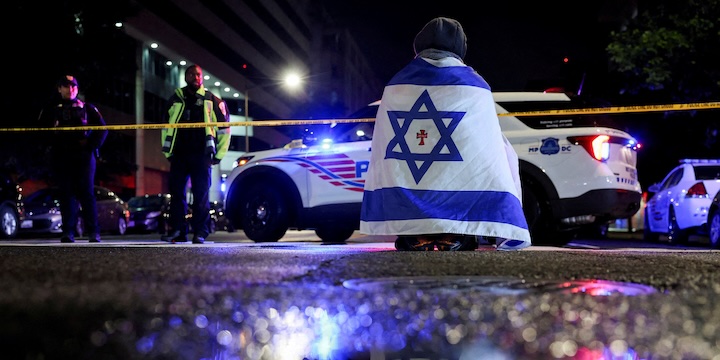FILE PHOTO: A man, with an Israeli flag with a cross in the center, looks on next to police officers working at the site where, according to the U.S. Homeland Security Secretary, two Israeli embassy staff were shot dead near the Capital Jewish Museum in Washington, D.C., U.S. May 21, 2025. Photo: REUTERS/Jonathan Ernst/File Photo
Most people think they would recognize antisemitism if they saw it: a slur, a swastika, or someone saying Jews deserved to be attacked on October 7. However, the public rarely hears about such antisemitism permeating workplaces in almost every industry nationwide.
In my work as a non-profit lawyer specializing in workplace antisemitism, I’ve learned that some of the most insidious harm happens and remains behind closed doors.
Since October 7, 2023, there’s been a visible spike in antisemitism worldwide. Jewish students are experiencing a surge in discrimination and harassment, Jewish institutions are being defaced, a patron at a Jewish-owned bar paid for a sign to be held up saying “F*** the Jews,” and Ye (Kanye West) recently released a music video titled “Heil Hitler.”
In workplaces, antisemitism is just as present and egregious, but far less publicized. That is because most workplace antisemitism cases do not end up in headlines. Often, workplace antisemitism cases end in a signature on an ironclad nondisclosure agreement (“NDA”) and subsequent silence.
Since approximately more than half of employment law cases settle at some point before trial, the lack of publicity on Jewish civil rights violations in workplaces is not surprising. Still, the secrecy surrounding how those cases are resolved has devastating ripple effects. Given that most workplace cases settle, employees experiencing workplace antisemitism rarely hear about other similar incidents, which could have empowered them to enforce their rights or set a meaningful precedent in the courts to help them assess their chances of success. Another reason workplace antisemitism cases often do not make headlines is that many employees do not report their concerns out of fear of retaliation.
In my work on employment-related antisemitism matters as Senior Counsel at StandWithUs Legal, a division of StandWithUs, many of our cases involve employees in medicine, education, service industries, and technology who simply wanted to do their jobs. What they experienced instead were hostile comments from colleagues, exclusion from diversity programs, denials of promotions, or even termination. Some were mocked for their Israeli nationality or Jewish identity in team meetings. Others were treated unfairly based on Israel’s military actions, were told that Jews started the California wildfires with laser beams, or were called genocidal by colleagues. One was repeatedly subjected to “Anne Frank” jokes by her supervisor.
Employers rarely know how to handle antisemitism, and since these cases usually settle and involve NDAs, employers often can avoid directly addressing the problem. Jewish identity is frequently treated as invisible or controversial. Some employers encourage political discussions about every global injustice except those affecting Jews, drawing lines around Jewish identity that no other minority group is asked to navigate.
Antisemitism in the workplace remains a largely invisible problem — one that’s growing, unchecked, simmering just beneath the surface. The chilling effect of these settlements, NDAs, and silence is profound. When someone is fired for raising concerns about antisemitism, or pushed out under the guise of “performance” after reporting a hostile work environment, they’re often offered severance in exchange for silence in an NDA. It’s a cruel choice: rebuild your life with some financial security, or speak out and risk everything. Most understandably take the deal, but that means the problem continues to go unaddressed.
Whether guiding an employee through the Equal Employment Opportunity Commission (“EEOC”) process, partnering with firms nationwide to sue, or interfacing with human resources or corporate general counsels to resolve the issue, I’ve seen firsthand how powerful the law can be in the workplace. It can force accountability, restore dignity, and, at its best, prevent future harm.
Louis Brandeis once said, “Sunlight is said to be the best of disinfectants.” While many of the victories I help achieve remain confidential, the mission is clear: to give voice to those who were silenced, empower employees to enforce their rights, and ensure that silence is no longer the cost of employment.
Deedee Bitran is Senior Counsel and Director of Pro Bono with StandWithUs Saidoff Legal.
The post There Is Massive Antisemitism in the Workplace; Here’s What You Need to Know first appeared on Algemeiner.com.
Click this link for the original source of this article.
Author: Deedee Bitran
This content is courtesy of, and owned and copyrighted by, https://www.algemeiner.com and its author. This content is made available by use of the public RSS feed offered by the host site and is used for educational purposes only. If you are the author or represent the host site and would like this content removed now and in the future, please contact USSANews.com using the email address in the Contact page found in the website menu.








